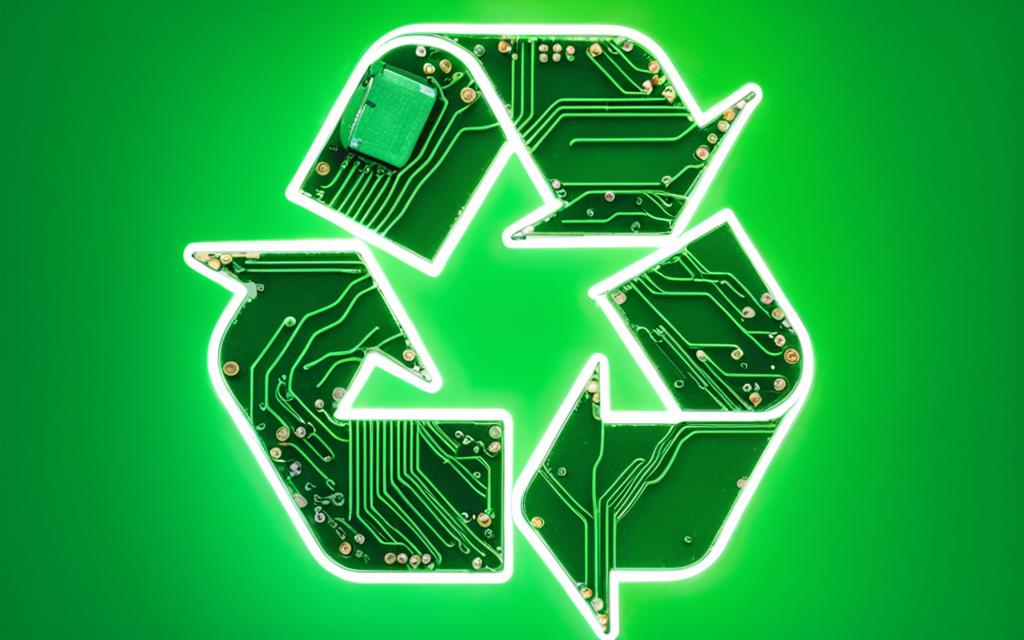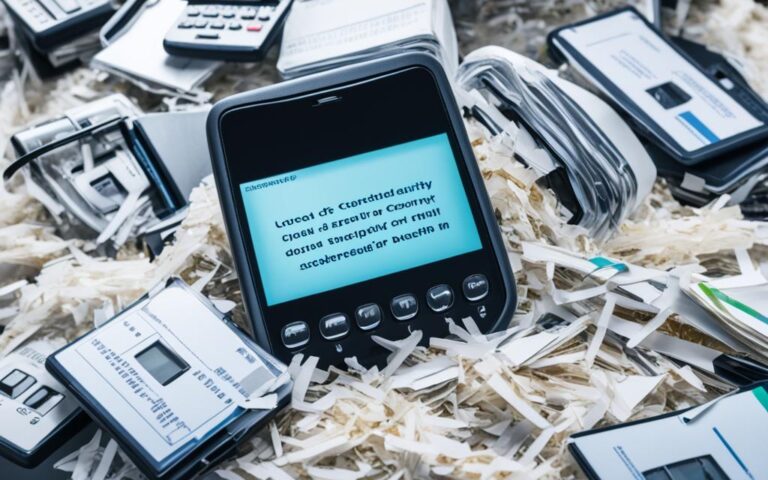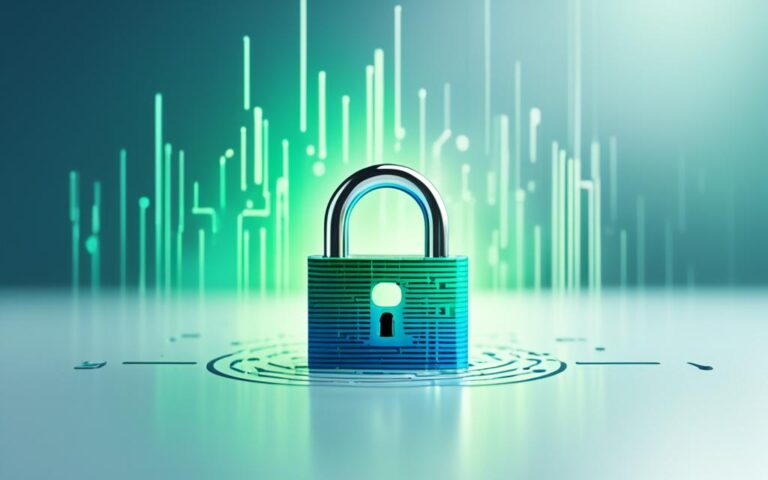Secure Data Recycling: A Sustainable Approach
Welcome to the world of secure data recycling, where organizations can safeguard confidential data and protect the environment simultaneously. With the increasing dependence on technology, organizations face the critical challenge of disposing of devices in a sustainable manner while ensuring the security of sensitive information. The consequences of improper disposal can range from data breaches to legal complications.
Implementing secure data disposal methods is crucial for organizations to comply with data protection and e-waste laws. By adopting techniques such as data wiping, degaussing, and physical destruction, organizations can securely erase data and prevent unauthorized access. These methods ensure that confidential information remains protected and unaffected, even after the retirement of devices.
It’s important to prioritize secure data recycling to avoid potential risks and liabilities. By adopting a sustainable approach to device retirement, organizations can contribute to a greener future. Take a closer look at the steps for securing data before device retirement, sustainable strategies for device retirement, and the environmental impact of responsible server recycling.
In the following sections, we will explore how organizations can mitigate security risks by securing data before device retirement. We will also delve into sustainable strategies for retiring devices, such as reusing and repurposing, extending computer lifespans, and donating old computers. Additionally, we will examine the environmental impact of server recycling and how it aligns with the goal of achieving a sustainable future.
Stay tuned to discover the best practices for secure data destruction and protection, as well as the importance of regulatory compliance and industry-specific requirements in server recycling. We will also discuss how optimizing IT investments and cost efficiency can be achieved through responsible disposal and certification.
Join us on this informative journey towards secure data recycling that not only protects sensitive information but also supports environmental sustainability and responsible recycling programs.
How to Secure Data Before Device Retirement
When it comes to retiring devices, secure data disposal is crucial to mitigate security risks and safeguard sensitive information. By following user guidelines and leveraging various data security methods, organizations can ensure the protection of data before the retirement of their devices.
User Guidelines
Implementing user guidelines is an essential step in mitigating security risks during the device retirement process. By providing clear instructions to employees, organizations can ensure that data is handled securely. Some key guidelines to consider include:
- Avoid storing confidential data locally and opt for cloud storage services that offer robust security measures.
- Encrypt sensitive data to add an extra layer of protection.
- Use strong and unique passwords or passphrases for all applications and accounts.
- Employ multi-factor authentication to enhance access control.
- Regularly update software and applications to address any security vulnerabilities.
Data Wiping
Data wiping is a widely recognized method for secure data erasure before device retirement. By overwriting all data on storage devices, it ensures that confidential information cannot be recovered. Organizations should adopt industry-standard data wiping techniques, such as those outlined in the NIST Special Publication 800-88, to ensure thorough data sanitization.
Degaussing
Degaussing is another effective method to secure data before device retirement, specifically for hard drives. This process demagnetizes the storage media, making it impossible to recover any data. By utilizing degaussing equipment, organizations can ensure that sensitive information is permanently erased from their retired devices.
Physical Destruction
Physical destruction methods, such as shredding, can render devices unreadable and offer an additional layer of data security. Through the destruction of the physical components, any residual data becomes irretrievable. It is important to ensure that physical destruction is carried out using certified methods and by reputable service providers.
By following these guidelines and utilizing secure data disposal methods, organizations can confidently retire their devices while mitigating security risks and protecting sensitive data.
How to Sustainably Retire Devices
After secure data erasure, organizations can consider reusing or repurposing older computers within the organization for less demanding tasks. Extending the lifespan of devices through component upgrades can also be cost-effective. Alternatively, donation to schools or nonprofit organizations can support the community. Employee purchase programs can provide a perk for employees and reduce waste.
Reusing and repurposing devices is an effective way to sustainably retire devices. Instead of contributing to e-waste, organizations can give older devices new life by repurposing them for tasks that don’t require the latest technology. This practice not only helps avoid e-waste, but it also reduces the need for new device production and conserves valuable resources.
Another approach to sustainably retiring devices is to extend their life spans through component upgrades. By upgrading processors, adding more memory, or installing solid-state drives, organizations can breathe new life into older devices and delay the need for complete replacement. This not only saves money but also contributes to a more efficient use of resources.
Donating Old Computers
One way to sustainably retire devices is by donating old computers to schools or nonprofit organizations. These organizations often have a need for computers but may not have the budget to purchase new ones. By donating used devices, organizations can support education and community initiatives while ensuring that their retired devices are put to good use.
Employee Purchase Programs
Another sustainable retirement option is to implement employee purchase programs. These programs allow employees to purchase retired devices at a discounted price, providing them with a cost-effective solution while reducing waste. By giving employees the opportunity to buy used devices, organizations promote sustainability, foster employee satisfaction, and extend the life of their retired assets.
By adopting these practices, organizations can make a positive impact on the environment and society as a whole while still managing their technological assets responsibly. Sustainably retiring devices through reuse, repurposing, and employee purchase programs not only avoids e-waste but also extends the life of devices and supports the community.
Environmental Impact and Sustainability
Server recycling plays a crucial role in promoting environmental sustainability by preventing hazardous materials from contaminating the environment.
The disposal of electronic waste, known as e-waste, poses significant environmental risks due to the presence of toxic substances such as lead, mercury, and cadmium. If these substances are not properly managed, they can leach into the soil and water, polluting the ecosystem and endangering human health.
By recycling servers, organizations ensure the safe disposal and treatment of e-waste, minimizing its harmful effects on the environment. Through responsible e-waste management practices, the recovery and reuse of valuable materials are prioritized, diverting them from landfills and reducing the need for new resource extraction.
“The proper disposal of electronic waste is vital for protecting our planet from pollution and conserving valuable resources.” – Jane Green, Environmental Scientist
Material recovery and reuse are key components of sustainable server recycling. When servers are recycled, valuable materials such as precious metals, copper, and aluminum can be extracted and reused, reducing the demand for new raw materials and the energy-intensive processes associated with their production.
The reuse of recovered materials also has significant environmental benefits. By repurposing these materials, the need for energy-intensive manufacturing processes is minimized, resulting in a lower carbon footprint and reduced greenhouse gas emissions.
Benefits of Server Recycling for Environmental Sustainability
Server recycling offers several environmental benefits:
- Promotes responsible e-waste management, preventing toxic substances from polluting the environment.
- Reduces the demand for new resource extraction, conserving valuable natural resources.
- Minimizes energy consumption and greenhouse gas emissions associated with the production of new servers and raw materials.
- Diverts e-waste from landfills, reducing the environmental impact of waste disposal.
- Contributes to global sustainability goals by adopting a circular economy approach and supporting a more sustainable future.
| Practices | Benefits |
|---|---|
| Material Recovery and Reuse | Reduces the need for resource extraction and energy-intensive manufacturing. |
| Eco-friendly Disposal | Prevents hazardous materials from contaminating the environment. |
| Reduced Carbon Footprint | Minimizes greenhouse gas emissions and energy consumption. |
| Conservation of Natural Resources | Preserves valuable natural resources by reusing materials. |
Data Security and Protection
Data security is a paramount concern when disposing of servers. Safeguarding sensitive information and ensuring its irretrievability are crucial aspects of secure data destruction. This section explores various techniques to protect data, including secure erasure and physical destruction methods.
Secure Erasure Techniques
Secure erasure involves overwriting data multiple times using advanced algorithms, rendering it unrecoverable by any means. By implementing secure erasure techniques that comply with recognized standards, organizations can effectively protect their confidential data. This ensures that even if the servers end up in the wrong hands, the information remains inaccessible.
“Secure erasure techniques guarantee that sensitive data is completely wiped from storage devices, leaving no traces behind.”
When employing secure erasure techniques, it is important to follow industry best practices and use reputable software or service providers. These experts have the necessary expertise and experience to ensure thorough and effective data wiping.
Physical Destruction Methods
In addition to secure erasure techniques, physical destruction methods can be employed to safeguard data. Physical destruction renders servers completely unusable, leaving no possibility for data recovery. This method is particularly effective for cases where data confidentiality is of utmost importance and cannot be compromised under any circumstances.
Physical destruction methods include techniques such as shredding, crushing, or disintegrating the servers. By completely destroying the devices, organizations can ensure that any sensitive data they once contained is obliterated beyond recovery.
Partnering with Reputable Service Providers
When it comes to data security and protection during server disposal, partnering with reputable service providers is essential. These providers specialize in secure data destruction and have extensive experience in handling sensitive information. They employ state-of-the-art techniques and comply with industry standards to ensure the highest level of data security.
By partnering with experienced service providers, organizations can have peace of mind knowing that their data is handled professionally and in accordance with the required security protocols. This not only safeguards the organization’s reputation but also minimizes the risk of data breaches and associated legal consequences.
Regulatory Compliance and Industry-Specific Requirements
In the realm of server recycling, regulatory compliance and adhering to industry-specific requirements are of utmost importance. Different sectors and industries have distinct demands when it comes to data protection regulations, certifications, documentation, and environmental standards. To ensure compliance and build trust among customers, stakeholders, and regulatory bodies, partnering with knowledgeable providers is essential.
Data Protection Regulations
In today’s digital landscape, data protection regulations play a crucial role in safeguarding sensitive information. Organizations must navigate through various frameworks and laws, such as the General Data Protection Regulation (GDPR) in the European Union or the California Consumer Privacy Act (CCPA) in the United States. Compliance with these regulations ensures that personal data is handled securely and transparently throughout the server recycling process.
Industry-Specific Requirements
Each industry has its own set of specific requirements when it comes to server recycling. For example, sectors such as healthcare, finance, or government have stricter data security protocols given the sensitivity of the information they handle. Meeting these industry-specific requirements involves understanding the nuances of the sector and implementing tailored solutions to mitigate risks effectively.
“Compliance with regulatory standards is not just a legal obligation; it is an essential aspect of building a responsible and trustworthy brand.”
Certifications and Documentation
To demonstrate adherence to regulatory compliance and industry-specific requirements, certifications and documentation play a vital role. Certifications validate an organization’s commitment to data protection and environmentally sustainable practices. Documenting policies, procedures, and audit reports not only aids in compliance but also provides transparency and accountability to all stakeholders.
Environmental Standards
In addition to data protection regulations, organizations must also consider environmental standards when recycling servers. The growing focus on sustainable practices necessitates responsible e-waste management and reducing the ecological footprint. Adhering to environmental standards ensures the proper disposal of electronic waste, prevents pollution, and promotes the circular economy.
Partnering with service providers who understand the intricacies of regulatory compliance and industry-specific requirements is crucial for successful server recycling. It not only ensures legal compliance but also establishes a reputation for trustworthiness and responsible environmental stewardship.
Optimizing IT Investments and Cost Efficiency
Optimizing IT investments is crucial for organizations aiming to maximize their cost efficiency and achieve optimal performance. One effective strategy to achieve these goals is through server recycling, which offers a range of benefits from physical space optimization to responsible disposal practices. By embracing server recycling, organizations can unlock significant financial savings while also aligning with environmental sustainability goals.
Server recycling plays a pivotal role in optimizing IT investments by freeing up valuable physical space. Obsolete servers take up valuable real estate within data centers, limiting the capacity for new hardware or hindering expansion efforts. By responsibly disposing of outdated servers through recycling, organizations can maximize their physical infrastructure, making room for newer and more efficient technologies that enhance performance and productivity.
Furthermore, server recycling contributes to long-term cost efficiency by reducing maintenance and operational expenses. Aging servers often require frequent repairs and upgrades, leading to increased maintenance costs over time. By recycling these servers and replacing them with newer, more reliable models, organizations can minimize maintenance expenses and enjoy better performance, efficiency, and reliability.
Responsible disposal of outdated hardware also ensures compliance with regulations, protecting organizations from potential audits or legal inquiries. Compliance with data protection and environmental standards is paramount in today’s business landscape. By partnering with certified recycling service providers, organizations can ensure that their old servers are disposed of properly, mitigating the risk of data breaches and environmental harm.
Certification of destruction is an essential aspect of server recycling, establishing a record of commitment to data security and responsible waste management. This certification offers a crucial layer of trust and transparency, providing assurance to customers, stakeholders, and regulatory bodies that data destruction has been carried out thoroughly and securely.
Environmental sustainability is another significant advantage of server recycling in optimizing IT investments. Recycling servers reduces e-waste, preventing harmful materials from entering landfills or being improperly disposed of. By embracing recycling practices, organizations demonstrate their commitment to responsible waste management and contribute to a more sustainable future.
| Benefits of Server Recycling |
|---|
| Physical space optimization |
| Reduction in maintenance costs |
| Compliance with regulations |
| Certification of destruction |
| Contributing to environmental sustainability |
By optimizing IT investments through server recycling, organizations can unlock cost efficiency, reduce environmental impact, and ensure compliance with regulations. This approach not only frees up physical space and reduces maintenance costs but also demonstrates a commitment to responsible disposal practices. Embracing server recycling enables organizations to align their IT strategies with environmental sustainability while maximizing cost savings.
Conclusion
Secure data recycling is crucial for organizations to safeguard sensitive data, contribute to environmental sustainability, and support responsible recycling programs. By adopting secure data disposal methods, organizations can ensure compliance with data protection laws, minimize security risks, and reduce e-waste.
Priority should be given to server recycling to pave the way for a sustainable future. This not only demonstrates a commitment to environmental responsibility but also frees up physical space, reduces maintenance costs, and optimizes IT investments.
Secure data deletion techniques, such as data wiping, degaussing, and physical destruction, provide organizations with reliable options to safeguard confidential information. These methods comply with data protection regulations and ensure that sensitive data is unrecoverable.
By actively participating in responsible recycling programs, organizations can play their part in conserving natural resources, reducing landfill waste, and supporting their communities. Secure data recycling is an essential practice that combines both data security and environmental sustainability for a better future.
FAQ
What is secure data recycling?
Secure data recycling refers to the process of disposing of devices in a sustainable manner while safeguarding sensitive data. It involves adopting secure data disposal methods, such as data wiping, degaussing, and physical destruction, to comply with data protection and e-waste laws.
How can I secure data before retiring a device?
To secure data before device retirement, it is recommended to follow user guidelines that mitigate security risks. This includes avoiding local storage and opting for cloud storage services. Additionally, data wiping using recognized standards like NIST Special Publication 800-88 can overwrite all data on storage devices. Degaussing can demagnetize hard drives, and physical destruction methods like shredding can render devices unreadable.
What can I do to sustainably retire devices?
To sustainably retire devices, you can consider reusing or repurposing older computers within your organization for less demanding tasks. Extending the lifespan of devices through component upgrades can also be cost-effective. Alternatively, donation to schools or nonprofit organizations can support the community. Employee purchase programs can provide a perk for employees and reduce waste.
What is the environmental impact of server recycling?
Server recycling plays a crucial role in promoting environmental sustainability by preventing hazardous materials from contaminating the environment. Material recovery and reuse reduce the need for new resource extraction and energy-intensive manufacturing. It contributes to a more sustainable approach to resource management, conserves valuable natural resources, and aligns with global sustainability goals.
How can I ensure data security during server recycling?
Data security is a paramount concern when disposing of servers. Secure data destruction techniques, such as secure erasure and physical destruction, ensure that sensitive information is irretrievable. Secure erasure involves overwriting data multiple times using advanced algorithms, while physical destruction renders servers completely unusable. It is essential to partner with reputable service providers experienced in data security to ensure proper disposal.
What is regulatory compliance in server recycling?
Compliance with data protection regulations and industry-specific requirements is necessary for server recycling. Different sectors and industries have unique demands, such as data security protocols, certifications, and environmental standards. Partnering with knowledgeable providers ensures compliance and builds trust among customers, stakeholders, and regulatory bodies.
How does server recycling optimize IT investments?
Server recycling optimizes IT investments by freeing up physical space and reducing maintenance costs. Responsible disposal of outdated hardware and compliance with regulations result in long-term financial savings. Certification of destruction provides a record of data security commitment and protects against audits or legal inquiries. Environmental sustainability through recycling contributes to cost efficiency and responsible waste management.
Why is secure data recycling important?
Secure data recycling is essential for organizations to protect sensitive data, contribute to environmental sustainability, and support their communities through responsible recycling programs. By adopting secure data disposal methods, organizations ensure compliance with data protection laws, minimize security risks, and reduce e-waste. Prioritizing server recycling leads to a sustainable future and demonstrates a commitment to environmental responsibility.













